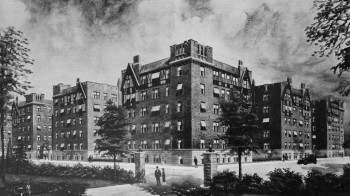At Home In Utopia

A 1926 artist's rendering of the Coops, a cooperative apartment complex built by immigrant Jewish garment workers in the Bronx.
Details
In the eight long years it took to complete At Home in Utopia, her documentary about a radical 1920s cooperative housing experiment in New York, Ellen Brodsky admits to having her moments of doubt.“There were definitely times when we worried,” says Brodsky, who co-produced the documentary with Michal Goldman, the film's director and writer.“The two big questions were: Would it get done and would it be seen?"
Brodsky's worries are over. At Home in Utopia, which premiered at the New York Jewish Film Festival at Lincoln Center in January and has been screening at festivals across the country since then, will get a national airing on April 28 on PBS's Independent Lens series. (Check local listings at www.pbs.org/independentlens.)
The film tells the story of the United Workers Cooperative Colony, known as“the Coops,” a complex of Bronx apartment houses built by a group of immigrant Jewish garment workers who were inspired by ideals of a just society. The complex, which housed more than 2,000 people, featured space for gardens, community rooms for meetings and dances, and a library with 20,000 volumes in Yiddish, Russian and English. The activist residents of the cooperatively owned Coops, many of whom were practicing communists, were on the cutting edge of a number of progressive social reforms. They pushed for unemployment insurance and mortgage relief during the Depression, and invited African American families to live in the complex in an era of segregation.
Early into the documentary project, Brodsky recalls reading about the lively debate during the planning stages of the Coops, which was one of four worker-owned complexes to rise in the Bronx. One side, she says, couldn't imagine taking time out from waging the revolution to build homes.“The other side, many of them women,” Brodsky says,“couldn't imagine raising the next generation of revolutionaries without living in a community committed to their radical ideals—and without cross-ventilation and a view from every window.”
Before becoming a filmmaker, Brodsky, who has a master's degree in human services management from Brandeis University, led a national training center on HIV prevention for the CDC, directed sexuality education programs in a number of school districts and was a Harvard University teaching fellow for classes on sexuality and positive psychology. But after she had two children, Brodsky found herself looking for a new direction for her professional life.
“At Haverford, I'd taken a 'film and the novel' course with John Ashmead and studied play writing with Professor [Bob] Butman,” Brodsky says.“I directed and acted in theater and I even went into Philadelphia to take an adult education course on how to make videos. So, I decided why not go back to my old love of storytelling?”
Brodsky started exploring video. One day, she was shooting some promotional footage for the Cambridge, Mass., cooperative daycare center her children (now 10 and 13) attended when a fellow parent spotted her with the camera. Andy Hazelton was an architect who'd taught courses on housing and he'd gotten a grant to make a documentary about the Coops. He asked Brodsky about directing.“As soon as I heard about it, I thought, That sounds like a PBS documentary,” recalls Brodsky.“I told him, I'm not that experienced, but I'll help you find a director.”
Enter Michal Goldman, whose films include A Jumpin Night in the Garden of Eden, about the revival of Klezmer music, and Umm Kulthum, A Voice Like Egypt, about the diva of Arabic music.“At this point I was trying to figure out, how do I learn filmmaking,” says Brodsky, who is married to fellow Ford Ted Rybeck '85, a business consultant.“I wanted to make the switch from public health but I wasn't sure how. Michal said why don't we do this together? So, rather than going to film school, I learned everything on the job.”
In the years it took to complete At Home in Utopia, which is narrated by actress Linda Lavin and includes interviews with many former residents of the Coops, now in their 70s, 80s and 90s, Brodsky completed another documentary, co-directed with Dunya Alwan. Titled Dental Farmer, it's about Brodsky's father-in-law, who ran a free dental clinic on an organic farm in West Virginia. That film won a director's choice award at the Black Maria Film Festival and is now touring the world as part of the Best of Rural Routes Film Festival.
A big boost to getting At Home in Utopia made, according to Brodsky, was the help of eight Bi-Co students who worked on the project through the Bryn Mawr/Haverford Career Development Office's extern program. Among them: Matthew Scheinerman '09, Elizabeth Sullivan '05, and Jane Steinemann '04.
“I still remember our first extern who showed up on a day when we had seven historians flown in from Boston to advise us,” she says.“It was her job to take notes.”“We had a student who did a 12 hour day for us at the Harvard library researching records on microfiche,” Brodsky continues.“And we've had students scanning archival photos and helping us with fundraising.” The most recent Bi-Co extern, Rachel Park BMC '10, helped with national outreach for the PBS broadcast.
At Home in Utopia takes the story of the Coops up to the 1950s, when the backlash of McCarthyism, along with dark revelations about the reign of Josef Stalin, moved residents to abandon the revolutionary vision their belief in communism had inspired.“It's a thought-provoking film that leads to a lot of debate,” says Brodsky.“But in general, the reaction has been overwhelmingly positive. People are grateful that a chapter of American activism that was made nearly invisible by McCarthyism has come to light.”
-Eils Lotozo
In addition to the April 28 PBS broadcast, At Home in Utopia will be screening at Jewish film festivals in Los Angeles (April 27), Seattle (April 27), Detroit (May 4) and St. Louis (June 15).
For more information go to:



